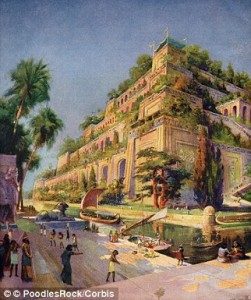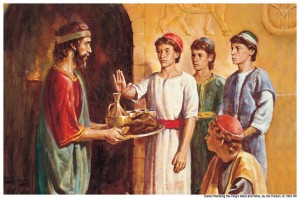In the world but not of the world
The Israelites were defeated. They were being occupied by the Babylonians. Their land was under the control of a foreign leader and some of the brightest and best of their young people had been carried way into exile.
Then the king ordered Ashpenaz, chief of his court officials, to bring into the king’s service some of the Israelites from the royal family and the nobility— young men without any physical defect, handsome, showing aptitude for every kind of learning, well informed, quick to understand, and qualified to serve in the king’s palace. Daniel 1:3,4
 We can guess at Nebuchadnezzar’s plan. He wanted to create a new generation of Jewish leaders who were more civilised and schooled in the languages, arts and sciences that Babylon was famous around the world for. Although the seat of learning was strong, Babylon itself had been partly destroyed in the various wars with the Assyrians while Nebuchadnezzar’s father had been king. Nebuchadnezzar was committed to rebuilding the city and bringing it back to its former glory.
We can guess at Nebuchadnezzar’s plan. He wanted to create a new generation of Jewish leaders who were more civilised and schooled in the languages, arts and sciences that Babylon was famous around the world for. Although the seat of learning was strong, Babylon itself had been partly destroyed in the various wars with the Assyrians while Nebuchadnezzar’s father had been king. Nebuchadnezzar was committed to rebuilding the city and bringing it back to its former glory.
So he took a generation of the best Israelite young men and brought them Babylon:
He was to teach them the language and literature of the Babylonians. Daniel 1:4
Now the likes of Daniel had several choices. They could have opposed everything they were asked to do, sour the relationships and end up being punished or even killed. Equally, they could have become completely assimilated. Given up on their people’s beliefs and faith and thrown themselves into the Babylonian ways in one of biggest cities of the world at the time.
Or there was a third way. To stay Jewish. To stay true to their faith but to engage with the opportunity they were being given to learn from some of best teachers in the world at that time. Nebuchadnezzar’s aim was no doubt to create a generation of Jewish men who could lead a subjugated nation. Understand Judaism but rule with Babylonian authority.
And that is what they did. They appear to have thrown themselves into the opportunity of learning. The opportunity of living in the Royal Courts under the King’s protection. And yet they remained faithful to their Jewish faith. God rewards their faithfulness.
I love this idea. They are “in the world” but not the “same as the world”. They understood and no doubt enjoyed the art, science and literature they were learning, but they remained sceptical and tested everything with their faith. They refused to eat the food provided as they feared it was defiled. God protected them from recriminations.
 Of course, this is more than just a survival tactic. Daniel can only carry out God’s plan for him if he has the ear of Nebuchadnezzar. If he understands the Babylonians. If he is living among them as trusted equal.
Of course, this is more than just a survival tactic. Daniel can only carry out God’s plan for him if he has the ear of Nebuchadnezzar. If he understands the Babylonians. If he is living among them as trusted equal.
The same is true for us today. If the church is a remote body filled with people separated in time, space and experience from the people around it, then how will it engage with and change the world? If church people know only people in the church, then how will they engage with a world that needs to hear their message?
Today ask yourself the question – how can I learn more of the culture, interests and fears of the people who I live and work with, so that I can understand, empathise and have the right to speak into their situation?












